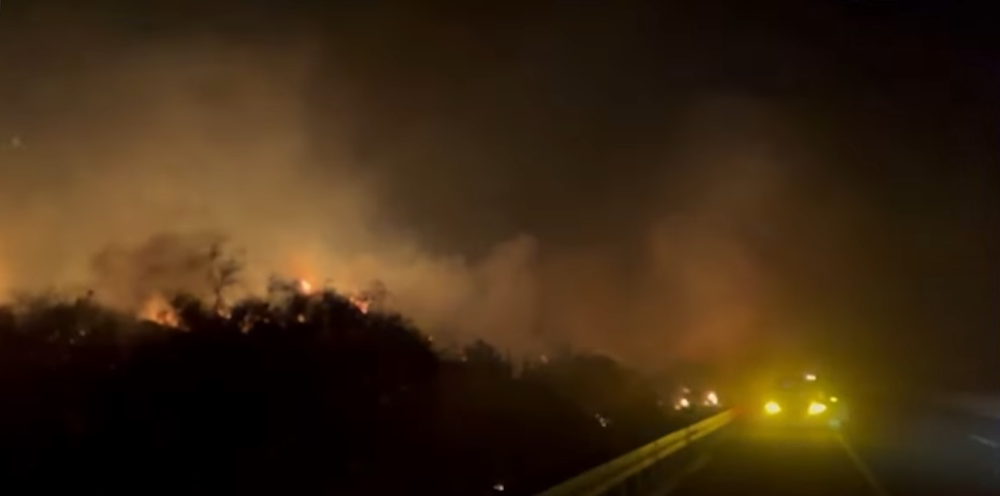Feud between Hezbollah and Israel sets land on fire, devastates crops
Yesterday more than 200 rocket attacks from Lebanese territory across the border in response to the killing of a movement official. About 95,000 people in Lebanon and 60,000 in Israel have been displaced for nine months. 8,700 hectares burned in northern Israel, about 4,000 in the Land of the Cedars. Fear of a large-scale conflict with "catastrophic" effects.
Beirut (AsiaNews) - The south of Lebanon is burning, as are large areas across the border in Israel. It is an emergency that has been going on for some time on the border between the two countries, where a bitter clash is taking place between the pro-Iranian Shiite militias of Hezbollah and the army with the Star of David.
It is a reflection of the continuing war in Gaza launched by the Jewish State against Hamas in response to the 7 October attack, now in its ninth month and with no real prospect of a truce, much less peace, in a Holy Land that is bloodied and increasingly on fire.
On the contrary, yesterday alone, the Lebanese movement launched over 200 rockets and drones across the border in response to the killing of one of its commanders, resulting in the death of an Israeli officer. The attacks also triggered a new series of fires, confirming a highly critical situation.
The clashes between the fighters of the Lebanese 'Party of God' and the Israeli military are at the origin of the numerous fires that are spreading along and across the borders and engulfing entire areas of forest or arable land, depriving the local population of one of the few resources with which they have been able to survive until now.
Although the conflict between the parties has not yet escalated into open warfare, the fires - exacerbated by supply shortages and security fears - have consumed thousands of hectares of land in southern Lebanon and northern Israel. And in a short time they have become one of the most visible signs of the escalation of the conflict.
The widespread belief is that a large-scale conflict could have 'catastrophic' consequences along both sides of the border, causing 'irreversible' damage. In Israel, images of fires caused by Lebanese militia rockets have provoked public outrage, with the Minister of National Security, the ultra-right-wing Itamar Ben-Gvir, going so far as to declare that "it is time for all of Lebanon to burn".
The fires in the Land of the Cedars started at the end of April, well before the usual fire season, and devastated largely rural areas along the border. Among the hardest hit areas is the Sunni town of Chebaa, where Hezbollah's presence is almost non-existent. Another area affected is the slopes of Mount Meron, Israel's second-highest mountain and home to an air base, where once there was a forest of native oaks, a dense thicket that offered shelter to wild animals, gazelles and rare species of flowers and fauna.
Today, the verdant slopes are interrupted by flames and scorch marks - the largest several hundred square metres - the residue of a Hezbollah explosive drone shot down a few weeks ago. Park rangers fear the devastation has only just begun.
"This year's damage is a dozen times worse," said Shai Koren, of the Israeli Nature and Parks Authority's northern district. Looking at the slopes of Meron, the expert continued, it is very likely that the forest will not survive the summer.
Since the beginning of the war, the army with the Star of David has traced more than 5,450 launches towards northern Israel. According to the Israeli think-tank Alma Research and Education Center, most of the first launches were short-range anti-tank missiles, but Hezbollah's use of drones has gradually increased over time. In Lebanon, officials and human rights groups accuse Israel of firing incendiary white phosphorus shells at residential areas in addition to regular artillery bombardments and air strikes.
The exchanges have intensified since the beginning of May, when Prime Minister Benjamin Netanyahu's government launched its offensive in Rafah, in the south of the Strip, a period that coincided with the beginning of the hot and dry season, which favours even large-scale arson attacks. In more than two months, Hezbollah attacks have burnt 8,700 hectares in northern Israel, according to the Israeli Authority for Nature and Parks. In southern Lebanon, on the other hand, about 4,000 hectares have been burnt due to Israeli attacks, according to George Mitri of the Land and Natural Resources programme at Balamand University.
In the previous two years, the total area of Lebanon burned annually was 500-600 hectares, while security problems hamper the response in the crucial early hours of a fire. In addition, firefighting aircraft are largely grounded for fear of being shot down by enemy-launched rockets.
On the ground, firefighters often cannot move without an army escort, while some 95,000 people in Lebanon and 60,000 in Israel have been displaced for nine months. Prime Minister Netanyahu has declared that as the fighting in Gaza subsides, Israel will send more troops to the northern border; a dramatic and worrying scenario, because it risks opening a new and devastating front and increasing the risk of even more destructive fires.
07/02/2019 17:28
12/02/2016 15:14
11/08/2017 20:05







.png)










